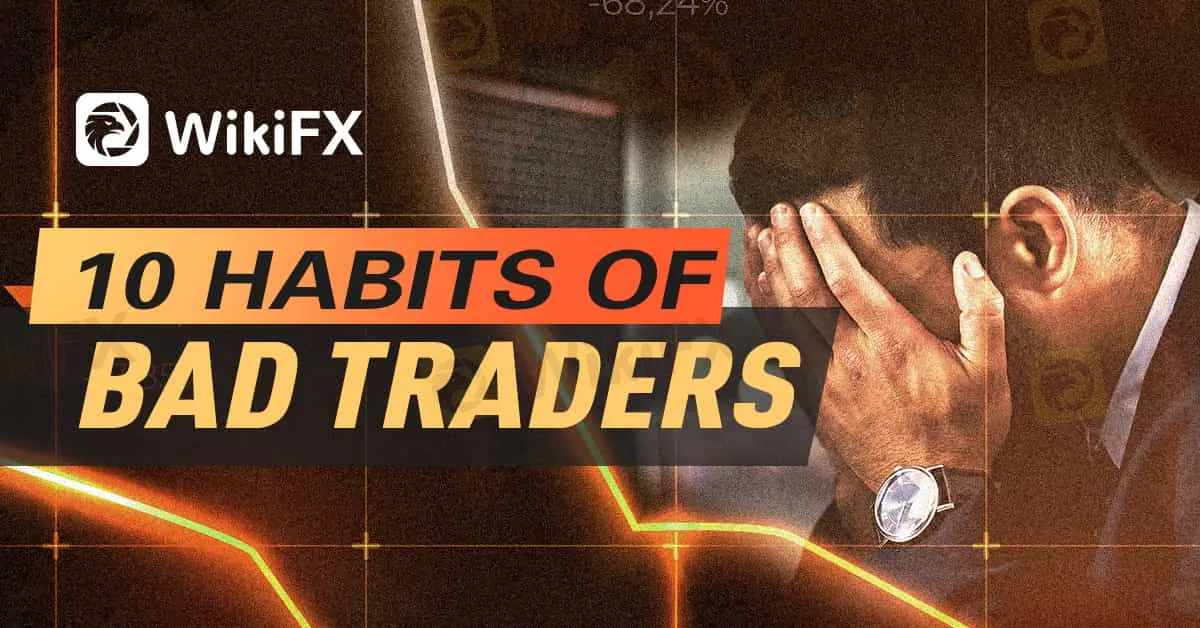简体中文
繁體中文
English
Pусский
日本語
ภาษาไทย
Tiếng Việt
Bahasa Indonesia
Español
हिन्दी
Filippiiniläinen
Français
Deutsch
Português
Türkçe
한국어
العربية
10 Habits of Bad Traders
Abstract:Forex trading can be unforgiving, especially for traders who possess certain habits that can lead to substantial losses. In this article, we'll explore ten habits that characterize bad traders in Europe and ways to avoid them.

Forex trading can be unforgiving, especially for traders who possess certain habits that can lead to substantial losses. In this article, we'll explore ten habits that characterize bad traders in Europe and ways to avoid them.
Overtrading: Bad traders have a compulsion to trade excessively, even when market conditions are unfavorable. This habit leads to increased transaction costs and potential losses.
Ignoring Risk Management: Bad traders often neglect risk management, putting a significant portion of their capital at risk on a single trade without proper risk control measures.
Lack of Patience: Impatience can be detrimental in forex trading. Bad traders jump into trades hastily without waiting for suitable entry and exit points.
Emotional Trading: Bad traders allow emotions to govern their decisions, leading to erratic trading behavior based on fear or greed.
Greed for Quick Profits: Bad traders seek quick profits and often engage in high-risk strategies, neglecting the importance of sustainable and consistent growth.
No Trading Plan: Bad traders lack a well-defined trading plan and often trade impulsively without a clear strategy in mind.
Ignoring Market Analysis: Instead of conducting thorough analysis, bad traders rely on hearsay or gut feelings, leading to uninformed decisions.
Revenge Trading: After experiencing a loss, bad traders engage in revenge trading, trying to recoup their losses quickly. This approach rarely ends well.
Lack of Learning: Bad traders are resistant to learning and improvement. They refuse to acknowledge mistakes and miss out on opportunities to grow.
Not Seeking Reliable Resources: Bad traders miss out on valuable resources like WikiFX, which provides crucial information, broker reviews, and educational content to help traders make informed decisions. Avoid these bad habits and check out WikiFX today to enhance your trading knowledge and skills.

Disclaimer:
The views in this article only represent the author's personal views, and do not constitute investment advice on this platform. This platform does not guarantee the accuracy, completeness and timeliness of the information in the article, and will not be liable for any loss caused by the use of or reliance on the information in the article.
Read more

Investors Beware! The Pound May Face a Downturn in the Second Half of the Year
Despite a recent short-term rebound in the British pound, a number of macroeconomic risks are emerging. Major institutions expect the pound to come under pressure in the second half of the year. Investors should closely monitor future policy and market dynamics.

Gold Prices Fall Instead of Rising, Hitting a Two-Week Low
Despite geopolitical tensions, gold prices have dropped sharply, reaching a two-week low. Markets refocus on Fed policy and broader macro trends.

Nigeria to Launch Sweeping Cybersecurity Reforms Amid Rising Digital Threats
With cyber threats escalating and economic losses exceeding ₦250 billion annually, Nigeria is launching comprehensive reforms to safeguard its digital future and build a more resilient cybersecurity infrastructure.

Fed Holds Rates Steady! Yen Faces Growing Uncertainty
The Fed stays put but strikes a hawkish tone. The yen remains under pressure as market uncertainty deepens.
WikiFX Broker
Latest News
Top Wall Street analysts like these three stocks for long-term growth
Dow futures slide 150 points as oil rises following U.S. bombing of Iran: Live updates
Asia-Pacific markets set to open lower as U.S. bombing of Iran escalates Middle East crisis
Oil at $100 a barrel? U.S. role in Iran-Israel fight fuels market jitters
Consob Blocks 7 Fraudulent Investment Websites Amid Ongoing Crackdown
MyFundedFutures Tightens Compliance Measures Following Regulatory Pressure
Investors Beware! The Pound May Face a Downturn in the Second Half of the Year
European markets start the week lower as Middle East crisis worsens
Latest FCA Warning List Out! Beware & Protect Your Money
European defense stocks sell-off intensifies after U.S. hits Iran
Currency Calculator



